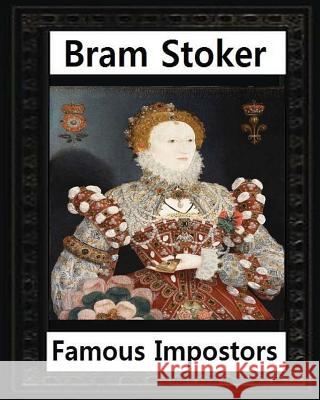Famous imposters (1910) by: Bram Stoker » książka
Famous imposters (1910) by: Bram Stoker
ISBN-13: 9781530360505 / Angielski / Miękka / 2016 / 140 str.
Famous Impostors is the fourth and final book of nonfiction by Bram Stoker (the author of Dracula), published in 1910.It is a book that deals with exposing various impostors and hoaxes. Abraham "Bram" Stoker (8 November 1847 - 20 April 1912) was an Irish author, best known today for his 1897 Gothic novel Dracula. During his lifetime, he was better known as the personal assistant of actor Henry Irving and business manager of the Lyceum Theatre in London, which Irving owned. He's best remembered as the legendary manager of London's Lyceum Theatre and author of the incalculably influential 1897 novel Dracula, but Bram Stoker was a prolific writer of numerous other works, including books of nonfiction. This curious 1910 work, one of his last, is an amusing survey of the charlatans, rogues, and other practitioners of make-believe who bedevil and delight us. With a cheerfully withering eye for their cons, Stoker introduces us to many famous fakers including: royal pretenders (such as Perkin Warbeck, who claimed King Henry VII's throne) magicians (Paracelsus, Cagliostro, etc.) witches and clairvoyants women masquerading as men hoaxers and others. Irish author ABRAHAM STOKER (1847-1912) worked for more than a quarter of a century as manager of the West End's Lyceum Theatre, which drew him.Stoker was born on 8 November 1847 at 15 Marino Crescent, Clontarf, on the northside of Dublin, Ireland. His parents were Abraham Stoker (1799-1876) from Dublin and Charlotte Mathilda Blake Thornley (1818-1901), who was raised in County Sligo. Stoker was the third of seven children, the eldest of whom was Sir Thornley Stoker, 1st Bt Abraham and Charlotte were members of the Church of Ireland Parish of Clontarf and attended the parish church with their children, who were baptised there. Stoker was bedridden with an unknown illness until he started school at the age of seven, when he made a complete recovery. Of this time, Stoker wrote, "I was naturally thoughtful, and the leisure of long illness gave opportunity for many thoughts which were fruitful according to their kind in later years." He was educated in a private school run by the Rev. William Woods. After his recovery, he grew up without further major health issues, even excelling as an athlete (he was named University Athlete) at Trinity College, Dublin, which he attended from 1864 to 1870. He graduated with honours as a B.A. in Mathematics. He was auditor of the College Historical Society ("the Hist") and president of the University Philosophical Society, where his first paper was on "Sensationalism in Fiction and Society."
Zawartość książki może nie spełniać oczekiwań – reklamacje nie obejmują treści, która mogła nie być redakcyjnie ani merytorycznie opracowana.











